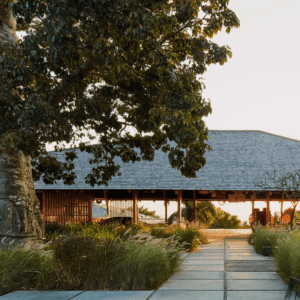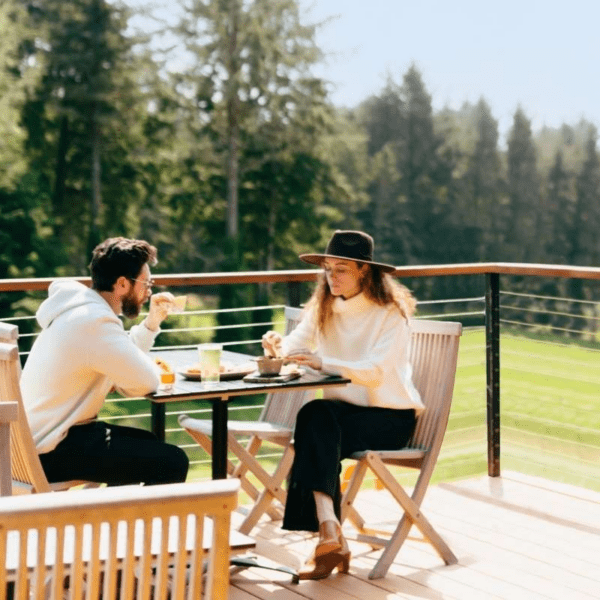
From Georgia to Ecuador, conscious hoteliers are making positive impacts around the world by paving the path forward with both guests and the environment in mind. Historic buildings and materials are finding new life. Natural and renewable energy sources are powering entire properties. And importantly, local communities and partnerships are always prioritized. When it comes to taking holistic approaches to sustainable actions, the following six hotels are leading the way.
GEORGIASituated in a former Soviet-era publishing house, Tbilisi’s Stamba Hotel is a contemporary industrial masterpiece. The original structure, façade, and historical details were meticulously preserved during its renovation and interiors feature repurposed, reclaimed, and vintage items, emphasizing a commitment to sustainable design. Beyond this, Stamba also developed the region’s first urban vertical farming project, Space Farms, an initiative focused on cultivating locally sourced, sustainably produced food across seven stories of racks with 200 square meters of surface. Space Farms utilizes 75% less water than traditional farming methods, and the produce is hand-picked and directly integrated into the dishes served at Stamba’s restaurants.
SWITZERLANDBackdropped by striking views of Matterhorn, Cervo Mountain Resort offers a modern take on a traditional Swiss mountain lodge, with a focus on producing the lowest possible carbon footprint—for the hotel and for guests. Following an extensive renovation, Cervo now covers nearly 95% of its energy requirements for hot water and heating with geothermal energy, and the remaining 5% are sourced from natural gas. Heat waste is repurposed, and solar panels line the balconies of accommodations. What’s more, guests are encouraged to not bring a car—Zermatt is, in fact, car-free—and are given the opportunity to offset their trip’s carbon emissions at check-out. Across the resort’s four restaurants, the kitchen staff sources products from within 150 kilometers wherever possible, and where this is not possible, they opt for sustainable and organic suppliers.
ICELANDAt Ion Adventure Hotel, set amongst the rugged lava fields near Selfoss, Iceland, 100% of energy needs are met by a local geothermal energy provider and all hot water comes from the ground via geothermal springs. With a natural spa, sauna, and outdoor pool, another particularly impressive achievement is in the property’s sustainable water system. All greywater undergoes a rigorous filtration process: first it passes through several layers of cleansing and is then filtered through lava to be reused in 50 years. Tables, chairs, and sinks were crafted from recycled materials, while natural materials, including lava, Icelandic wool, and upcycled wood, abound. Due to the hotel’s remote location, a connection to the surrounding community is also essential; all products for the restaurant and other services are sourced from and provided by local farms and businesses.
TANZANIAThe world’s first EarthCheck Gold–certified hotel, Zuri Zanzibar was constructed using materials sourced entirely on-island. The village-like Tanzanian resort—replete with palm-shaded hammocks, thatched-roof bungalows, and a private beach—showcases the country’s craftsmanship in wooden floors, doors, and roofs. In an effort to not extract from the limited resources of nearby communities, the property has its own water wells and desalination plant. Plus, numerous social projects are carried out in partnership with local organizations. With “Keep Kendwa Clean!”, for example, the hotel placed waste collection points around the local village, and every Wednesday they host an African Night Market with local vendors selling their wares.
ECUADORA certified B Corporation, LEED, and Green Globe property, Carlota is a majestic turn-of-the-century hub in Quito, Ecuador. Created by Originals Renato Solines and Veronica Reed, the 12-room property is housed in Solines’s grandmother’s former home, originally built in 1905. During the masterful restoration, the couple salvaged 90% of the building, including walls, flooring, doors, and windows. They used the home’s original furniture whenever possible and built new heirloom-quality pieces with reclaimed wood. Efficient appliances and LED lighting are used throughout the hotel, which also generates 25–30% of its energy consumption through an onsite solar energy system. Beyond this, Carlota has also become a cultural beacon in the community, hosting events, exhibitions, and salon-style talks.
JAMAICAA pioneer of sustainable practices in Jamaica, Negril’s Green Globe–certified Rock House Hotel has developed extensive measures to conserve water and energy and support the local community for more than 25 years. There is an onsite organic farm, plant nursery, and wood workshop; guests are given reusable water bottles for water-filling stations found throughout the property; and Rockhouse even makes its own candles and spa products. Events held at the hotel support local initiatives, such as Negril Candle Company, which hosts candle making workshops, and Patoo Chocolate, whose psilocybin-infused chocolate is used for optional micro-dosing during a weekly two-hour sound-bath (psilocybin fungi are legal in Jamaica). This dedication extends to the social side too: since 2004, the Rockhouse Foundation has invested more than USD 7 million in building, renovating, and expanding six public schools in Negril, where guests can also volunteer.














